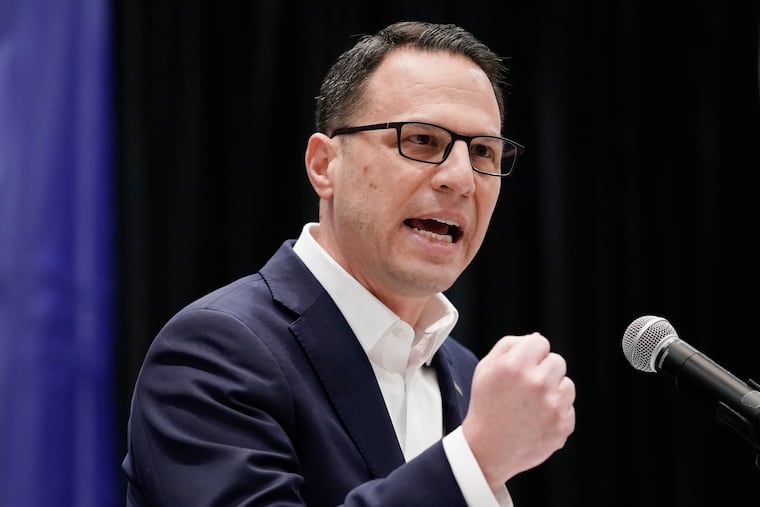Jury convicts woman of running $2 million ‘pill mill’ but clears doctors who wrote prescriptions
Attorney General Josh Shapiro said the operator put thousands of oxycontin pills on the street.

A jury has convicted the owner of a string of group homes in North Philadelphia of operating a multi-million dollar “pill mill,” but acquitted two doctors of joining her in a brazen operation that state prosecutors said put thousands of oxycontin pills on the street.
The owner, Evelyn “Tracie” Smith, 56, of Camden, skipped the reading of the verdict in Norristown on Monday and the judge in the case issued a bench warrant for her arrest as a fugitive, said Smith’s lawyer, Nino Tinari.
The Montgomery County Common Pleas Court jury deliberated for two and a half days before convicting Smith, who owned and managed three group homes in three-story rowhomes on one block on North 18th Street, near Tioga Street. She was found guilty of two counts of drug dealing and a single count of filing a false medical assistance claim, but acquitted on Medicaid fraud, identity theft and conspiracy to administer a controlled substance.
The doctors, Emmanuel Okolo, 54, of Ambler, and Mohanad Fallouh, 53, of Blue Bell, who faced the same set of charges, were acquitted on all counts.
Prosecutors said Smith, a nurse with a extensive criminal record, provided the doctors with the personal identification and Medicaid numbers of scores of her tenants so she and a cousin, Kent Hunter, could obtain fraudulent prescriptions from pharmacies in Chestnut Hill, Skippack, and Lansdale. Smith and Hunter then sold the drugs on the street, prosecutors contend.
Hunter, 55, of Philadelphia, pleaded guilty Sept. 15 to drug dealing and conspiracy. He testified for the prosecution.
Smith has a criminal record dating back 35 years. She has numerous previous convictions for forgeries and thefts and was sentenced in 1998 for up to five years in prison for robbery. City and state officials could not immediately explain why she was able to operate a group-home business.
Her sentencing in the pill mill case is set for May 20.
In 2020, state Attorney General Josh Shapiro had accused the defendants of pouring “fuel onto the fire of the opioid crisis.”
“This was a massive operation that breached good faith and breached the Pennsylvania law,” Shapiro said then in announcing a grand jury presentment. “And they did so knowing they were preying on some of the most vulnerable.”
A spokesperson for Shapiro, who is seeking the Democratic nomination for governor, said the office was disappointed that the doctors were found not guilty but was pleased with the convictions of Hunter and Smith, whom the spokesperson referred to as the “ringleader.” The spokesperson added, “Pennsylvania lost 5,172 lives to overdoses in the last year alone. We must continue to hold bad actors accountable who profit off of addiction.”
Lawyers for Okolo and Fallouh, lauded the jury’s decision.
“Since his arrest, Dr. Fallouh strenuously maintained his innocence against all accusations. He and his family are elated at the jury’s determination,” said his attorney, Andrew J. Levin.
“I am thrilled the jury saw fit to acquit Dr. Okolo on all charges,” said his attorney, A. Charles Peruto, Jr.
Okolo and Fallouh voluntarily surrendered their medical licenses after being arrested. Okolo will seek to get his license back, said Peruto, while Levin said he was not sure of Fallouh’s plans. The doctors worked at the Carriage House Medical Group in Flourtown, Montgomery County, at the time of their arrests.
Prosecutors told the jury that between 2015 and 2017, the two doctors wrote 1,009 fraudulent prescriptions for oxycodone and Xanax, totaling 99,753 pills with a street value of nearly $2 million, under the names of more than 100 tenants living in the three properties. Okolo and Fallouh were accused of frequently writing prescriptions without having met the patients for whom they were prescribing the medication, then turning them over to Smith.
Their attorneys said that after the two doctors started working with Smith, they grew suspicious and gradually began reducing the number of prescriptions they wrote.
Peruto said of the jury: “They were intelligent enough to realize the number of pills was only one factor in this case.”
Prosecutors began investigating after a tenant went to pick up a legal prescription and the pharmacist noticed numerous other prescriptions filled in the tenant’s name, of which the tenant was unaware. The pharmacist then alerted the patient’s insurance company, which contacted authorities.